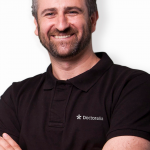
Frederic Llordachs (referred to below as FL), doctor and founder of the online portal Doctoralia, in an interview with Montse Moharra (referred to below as MM), coordinator of the Catalonia’s Observatory of Innovation in Health Management (OIGS), defends the position that medical professionals should take advantage of the current boom in new technologies to improve service provision. Frederic is confident that in the next few years’, teleconsultation, distance care provision and above all virtual triage will become established practice.
MM: How would you rate the level of innovation in the Catalan healthcare system as it stands today?
FL: It’s an excellent public service and the public are still not fully aware of the social advantages this represents. However, I believe that the current healthcare model is not the most ideal and we should be evolving towards more sustainable models such as those implemented in Holland and Germany.
MM: And do you think the field of Healthcare 2.0. is progressing at the right pace?
FL: Great effort is being made in this area and the digitalization process of public resources on the scale of the HIMSS (Healthcare Information and Management Systems Society) is a good example of this. Progress has also been made by way of providing the public access to their data via the La Meva Salut (My health) channel. However, as yet there is no integration with the private healthcare sector, which represents almost 30% of services used by the public. But I’m sure this will be addressed.
MM: Are initiatives such as those undertaken by the Innovation in Healthcare Management in Catalonia (OIGS, as per the Catalan acronym) helping in this shift towards innovation?
FL: As Lord Kelvin said: “If you cannot define it, you cannot measure it; if you cannot measure it, you cannot improve it; that which is not improved will always become degraded”. In this sense, the Observatory helps define and measure potential improvements, and provides the sector with ideas to implement.
MM: Which of the Observatory’s experiences would you highlight as the most noteworthy on a practical level?
FL: Undoubtedly, the pre-operatory online assessment carried out by the Hospital de Viladecans, a multi-award winning practice internationally since 2012 which, inexplicably, has yet to be implemented in the rest of the public healthcare network.
MM: How should healthcare professionals approach the changes associated with innovation in their day-to-day?
FL: Three years ago, the multi-millionaire technologist Vinod Khosla announced that in ten years’ time, 80% of doctors’ work would be performed by machines and it is easy to see how this prediction could be expanded to include other healthcare professions. The best way to cross a river is to do so with, not against the current, so the best way to survive the innovation tsunami heading our way is to become part of it. We must concentrate on the areas where we can make improvements and lead innovation from the positions we hold: sometimes changes can seem insignificant, but the outcomes can make an enormous impact. As the fictional Catalan TV character Capità Enciam used to say: “Small changes are powerful!”.
MM: Where do you see the developments in the Catalan healthcare system in terms of e-health in five years’ time?
FL: I imagine a patient with access to their public and private information who is connected via a standard similar to the American system Blue Button, and that health professionals have access to this information. I imagine sensorization and telemedicine services capable of resolving issues online for chronic patients. I imagine the public not having to travel unnecessarily for routine services, such as postoperative wound check-ups, and also that patients will be able to receive physiotherapy from the comfort of their homes. Above all, I envisage online triage using algorithms designed to reduce the care workload and reinforce self-healing, but then maybe I’m letting my imagination run a little wild…
MM: And what do you think Doctor’s work will be like?
FL: Just as we make house calls now, doctors will be performing teleconsultation, because finally, the system will compensate them for this. And patients will be able to have a virtual appointment with a specialist together with their GP, just as health Insurance and mutual health Insurance companies are doing nationwide today, organizations such as Sanitas and Mutua Universal. But the one thing that’s sure to happen is that we’ll continue doing what doctor’s do.
